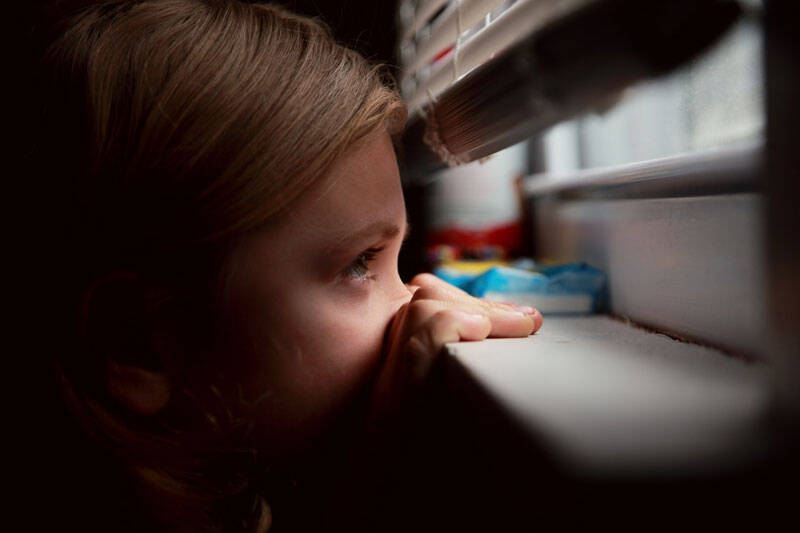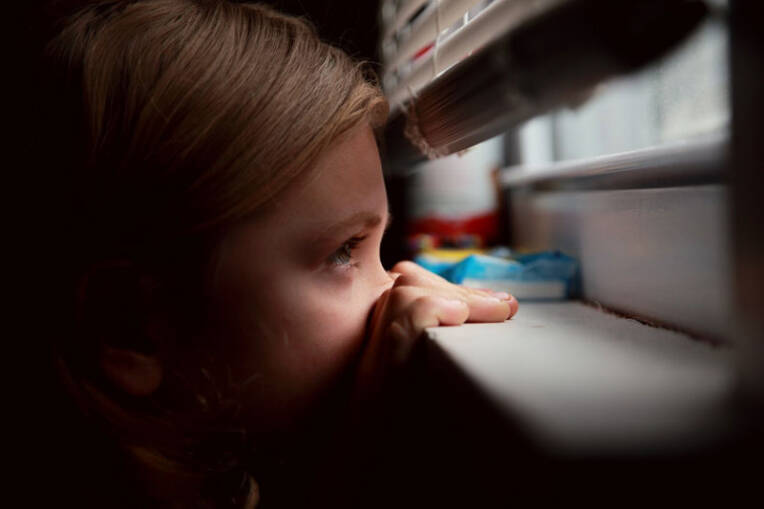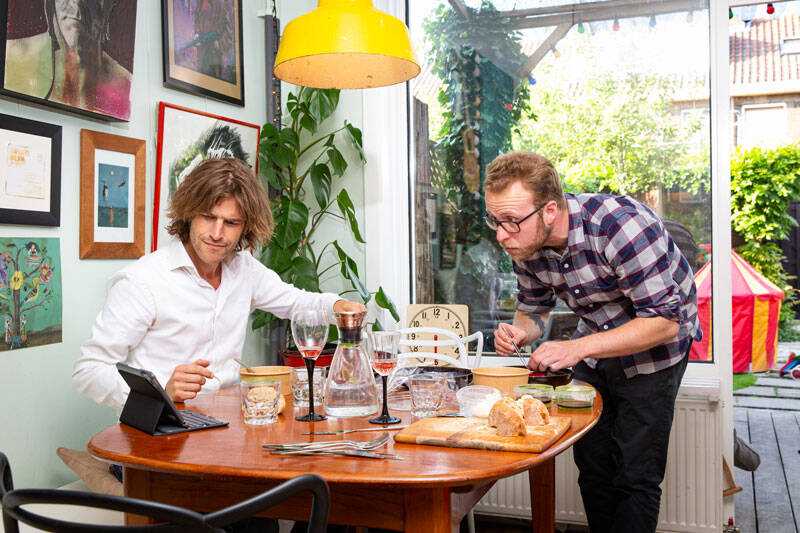
Sources
www.universiteitleiden.nl/en/news/2020/03/how-can-families-weather-the-corona-crisis
Zhang, H, ‘The Influence of the Ongoing COVID-19 Pandemic on Family Violence in China’, in: Journal of Family Violence (Sep 2020).
Leslie E. Roos and Lianne Tomfohr-Madsen, ‘Family mental health crisis: Parental depression, anxiety during COVID-19 will affect kids too’, The Conversation, august 16 2020.
www.hu.nl/onderzoek/projecten/de-impact-van-covid-19-op-gezinnen
The pandemic: a reconnector and troublemaker

Although it might never be easy, there are some tips that help alleviate stress in family situations. Here are some:
Good physical health: for example a healthy diet, enough sleep and physical activity.
A healthy diet: make sure you eat enough fruits and vegetables every day.
Structured daily rhythm: set times for meals, work and leisure time.
Connect: now, more than ever, connect over food during (digital) meals.
Social support: look for the ways to connect with people that are possible.
Get in contact with food and nature: grow a garden, visit a farm, make a walk through the park, etc.
Talk about the problems that every person involved deals with.
Stay informed about the latest COVID-measures, but don’t overkill yourself with the news. Look for information at most three times a day
The researchers stress that it’s impossible to predict whether these developments will have lasting effects after the pandemic.
Parenting problems
The accumulation of stressors may lead to various problems. Firstly, stressed parents are often associated with having parenting problems. At the same time, stressed children are more likely to exhibit ‘difficult behaviour’. The fact that children in many regions weren’t able to go to school, put even more strain on home life. In the long run, mental health problems such as anxiety and depression are more likely to occur, both with children and parents. This does not mean that every stressed parent has trouble parenting and will get mental health problems, but the chances do increase. Secondly, a study in China shows that cases of domestic violence increased during the pandemic. In most cases of domestic violence, females are victims. It is important to note that these negative effects of stress are stronger in families that are already at a disadvantage, such as families that have a lower level of education and/or socio-economic status or families that face racism and systemic oppression.
Most scientific and governmental studies focus on the negative effects of COVID-19, as they aim to address problems. However, it’s not all bad news. The increased contact with family members may also strengthen relationships. In the aftermath of the 2002-2003 SARS epidemic, 60% respondents of a survey stated they: "Cared more for the feelings of family members". When the COVID-19 lockdown in Wuhan ended, the amount of marriage applications tripled. An Australian survey taken in May, found that of the people that noticed changes in their relationships, 52% put more effort in maintaining their relationships with family. An (albeit small) survey in the US from the same month, found that three quarters of the couples who participated, said their relationships had not changed much. 17% said their relationships improved.
A research group of Hogeschool Utrecht used a survey to investigate the impact of the pandemic on family life, specifically the relation between grandparents and grandchildren and the way households function. The research group was able to present some preliminary findings, which were mostly positive:
Stressors
The recent increased contact between family members has positive and negative effects. Spending a lot of time with close family may cement relationships, but on the flipside, sudden increased contact can also lead to friction, that goes beyond small annoyances like talking loudly or not doing the dishes properly. The pandemic has caused health concerns, financial hardship, lack of work, diversions and a loss of social structures. All these factors contribute to stress, which sometimes are then expressed at home. It is too early for a comprehensive view on the impact of COVID-19 on family dynamics, as statistical data is lacking. A large international research project, run in 72 countries, is on it’s way.
Jurgen Elenbaas Sander van der Meij
The recent COVID-19 pandemic has drastically changed our social life. In most countries social interactions are restricted. Over the last months it has become difficult to meet with friends and family. With people working from home, events being cancelled and restaurants closed, spare time is mostly spent at home. What this means is that people spend more time with their families.
trendwatch
4 min
THE IMPACT OF COVID-19 ON FAMILY RELATIONS
More grandparents use modern communication, i.e. video calls, instead of ‘traditional’ phone calls. They did however indicate that they missed physical contact.
of the respondents did more activities together as a family.
48%
of the respondents said their relations improved.
55%
of the respondents reported more quarrels within their families.
30%




Sources
www.universiteitleiden.nl/en/news/2020/03/how-can-families-weather-the-corona-crisis
Zhang, H, ‘The Influence of the Ongoing COVID-19 Pandemic on Family Violence in China’, in: Journal of Family Violence (Sep 2020).
Leslie E. Roos and Lianne Tomfohr-Madsen, ‘Family mental health crisis: Parental depression, anxiety during COVID-19 will affect kids too’, The Conversation, august 16 2020.
www.hu.nl/onderzoek/projecten/de-impact-van-covid-19-op-gezinnen

Although it might never be easy, there are some tips that help alleviate stress in family situations. Here are some:
Good physical health: for example a healthy diet, enough sleep and physical activity.
A healthy diet: make sure you eat enough fruits and vegetables every day.
Structured daily rhythm: set times for meals, work and leisure time.
Connect: now, more than ever, connect over food during (digital) meals.
Social support: look for the ways to connect with people that are possible.
Get in contact with food and nature: grow a garden, visit a farm, make a walk through the park, etc.
Talk about the problems that every person involved deals with.
Stay informed about the latest COVID-measures, but don’t overkill yourself with the news. Look for information at most three times a day
More grandparents use modern communication, i.e. video calls, instead of ‘traditional’ phone calls. They did however indicate that they missed physical contact.
of the respondents said their relations improved.
55%
of the respondents did more activities together as a family.
48%
of the respondents reported more quarrels within their families.
30%


The researchers stress that it’s impossible to predict whether these developments will have lasting effects after the pandemic.
Parenting problems
The accumulation of stressors may lead to various problems. Firstly, stressed parents are often associated with having parenting problems. At the same time, stressed children are more likely to exhibit ‘difficult behaviour’. The fact that children in many regions weren’t able to go to school, put even more strain on home life. In the long run, mental health problems such as anxiety and depression are more likely to occur, both with children and parents. This does not mean that every stressed parent has trouble parenting and will get mental health problems, but the chances do increase. Secondly, a study in China shows that cases of domestic violence increased during the pandemic. In most cases of domestic violence, females are victims. It is important to note that these negative effects of stress are stronger in families that are already at a disadvantage, such as families that have a lower level of education and/or socio-economic status or families that face racism and systemic oppression.
Most scientific and governmental studies focus on the negative effects of COVID-19, as they aim to address problems. However, it’s not all bad news. The increased contact with family members may also strengthen relationships. In the aftermath of the 2002-2003 SARS epidemic, 60% respondents of a survey stated they: "Cared more for the feelings of family members". When the COVID-19 lockdown in Wuhan ended, the amount of marriage applications tripled. An Australian survey taken in May, found that of the people that noticed changes in their relationships, 52% put more effort in maintaining their relationships with family. An (albeit small) survey in the US from the same month, found that three quarters of the couples who participated, said their relationships had not changed much. 17% said their relationships improved.
A research group of Hogeschool Utrecht used a survey to investigate the impact of the pandemic on family life, specifically the relation between grandparents and grandchildren and the way households function. The research group was able to present some preliminary findings, which were mostly positive:
Stressors
The recent increased contact between family members has positive and negative effects. Spending a lot of time with close family may cement relationships, but on the flipside, sudden increased contact can also lead to friction, that goes beyond small annoyances like talking loudly or not doing the dishes properly. The pandemic has caused health concerns, financial hardship, lack of work, diversions and a loss of social structures. All these factors contribute to stress, which sometimes are then expressed at home. It is too early for a comprehensive view on the impact of COVID-19 on family dynamics, as statistical data is lacking. A large international research project, run in 72 countries, is on it’s way.
Jurgen Elenbaas Sander van der Meij
The recent COVID-19 pandemic has drastically changed our social life. In most countries social interactions are restricted. Over the last months it has become difficult to meet with friends and family. With people working from home, events being cancelled and restaurants closed, spare time is mostly spent at home. What this means is that people spend more time with their families.
The pandemic: a reconnector and troublemaker

4 min

















